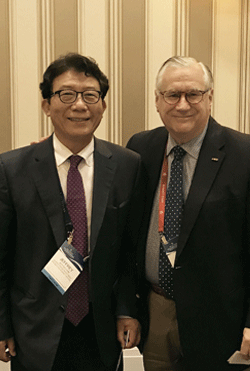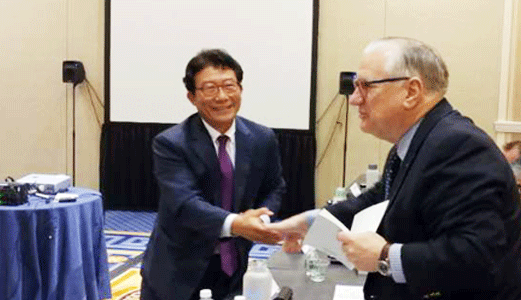

Last week ‘SelectUSA’ convened
its 2017 Annual Investment
Summit. The Meeting was held
in Washing-ton D.C. during
June 18-20 and was attended by more than
2,500 people including government officials
and business men. Participants were
not only from the United States but also
from many other parts of the world.
SelectUSA invited me as a special
guest to speak about the role of Korea’s
foreign investment ombudsman and its
success stories. I talked about Korea’s
FDI policy and aftercare services to foreign-
invested companies. Also, I argued
that any country receiving FDI, regardless
of whether it is an advanced or developing
country, needs to have an ombudsman
system.
Having discussed various FDI issues
with the roundtable participants, I have
learned some special features about
SelectUSA. It is the premier federal
investment program designed to promote
and facilitate foreign direct investment
into the U.S. Its principal aim is to substantially
create jobs through increased
exports.
SelectUSA was founded in March 2007
under the original name ‘Invest in
America’. It was established to promote
the U.S. as a destination for FDI. It supports
foreign governments, foreign
investors and state governments in their
efforts to attract FDI into the United
States. Additionally, it serves as the
ombudsman in Washington, D.C. for the
international investment community.
SelectUSA widely publicizes the strong
investment qualities of the country and
urges global investors to select the U.S.
for investment. It proudly points out the
nation’s merits such as transparent and
stable business environment, predictable
legal system treating all companies equally
and a huge consumer market with a
population of 325 million. Most notably,
its workforce is well-educated, productive, innovative and mobile.
Despite all these merits for investment,
the U.S. was not the top country in the
ease of doing business ranking.
According to the World Bank’s 2016
assessment, it ranked 8th. In order, the
top 10 countries in the ranking are New
Zealand, Singapore, Denmark, Hong
Kong, South Korea, Norway, the UK, the
U.S., Sweden and Macedonia.
This is a result of using different criteria
developed by the World Bank's
research team, which measures the
degrees of regulations in 11 areas. These
categories include various factors, including
starting a business, dealing with construction
permits, getting electricity, registering
property, getting credit, protecting
minority investors, paying taxes, trading
across borders, enforcing contracts,
resolving insolvency and labor market
regulation. They use data reported from
more than 130,000 firms in 139
economies.
Comparing the two approaches taken
by SelectUSA and the World Bank, one
can see that SelectUSA focuses on the
provision of non-discriminatory benefits
to investors whereas the World Bank tries
to measure the degrees of regulations
affecting foreign investors. The World
Bank’s assessment of the ease of doing
business is critically affected by the host
country’s discriminatory incentives and
after-care services given to foreign
investors.
In general, advanced countries like the
U.S. would not provide discriminatory
benefits to attract foreign direct investment
like developing countries. However, the hosting country should compensate
the foreign investors for unjustifiable grievances they suffer from.
Foreign-invested companies unexpectedly
encounter numerous difficulties and
problems due to lack of local information,
difficult communication and different
interpretations of the laws between two different agencies of the same
government.
It is imperative that while

advanced
countries should
present non-discriminatory
benefits to investors, they should
provide foreign investors with proper
aftercare services to compensate for their
grievances.
Nowadays both advanced and developing
countries have a number of tasks to
focus on, including keeping the GDP
growth rate stable and creating jobs. To
fulfill this task, they should strive not
only to attract foreign direct investments
but also to keep them for a longer period.
Most of all, building trustworthy
human relationships is most important. It
is worth remembering, “Programs are
programs but programs become successful
because of people.” This quote is from
the welcoming statement made by Fred
Volcansek, Executive Director of
SelectUSA. The number of foreign
investment ombudsman in the world is
still very small. There is no doubt, however,
that their collaboration and cooperation
with SelectUSA will bring about
much increased benefit to all the countries
involved.
The Foreign Investment Ombuds-man and his grievance resolution body collect and analyze information concerning problems facing foreign firms, request cooperation from relevant government agencies, propose new policies investment promotion system and carry out other necessary tasks to assist foreign-invested companies in resolving their grievances.